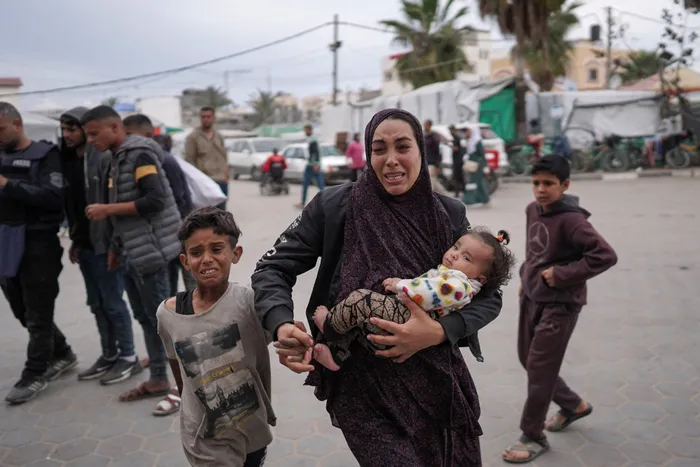Middle East tension bolsters SA reserves as gold prices rocket

Palestinians at a hospital where casualties of Israeli bombardment on al-Bureij camp in the central Gaza Strip were transported on April 8, 2024, as the war between Israel and the Hamas movement continues. – Picture: AFP
By Bonke Dumisa
I am deliberately an independent economic analyst who primarily focuses on South African market indicators and global market indicators. There is, however, sometimes a thin line between global market jitters and the underlying global political dynamics; hence, even economic analysts, like myself, must also fully understand the global political environment to analyse the consequential global economic dynamics.
On September 1, 1939, a German warmonger called Adolf Hitler invaded Poland, which triggered the European phase of World War II and the beginning of the six-year World War II that, ultimately, ended on September 2, 1945, and left tens of millions dead across the world.
By the same token, Benjamin Netanyahu, the Prime Minister of Israel, has accused Hamas in Palestine of having attacked Israel and captured some hundreds or thousands of Israelis in October 2023.
To date, more than 34,000 Palestinians have been killed by Israeli forces. Some have estimated that the Palestinians have killed more than 100,000. Regardless of the number you believe, the bottom line is that tens of thousands of Palestinians have been killed by Israeli armed forces. They continue the Palestinian killings with impunity because of their backing by the US, Germany and their allies.
It was against this bravado of killing Palestinians with impunity that Israel decided to attack the Iranian Embassy and its compound in Syria on April 1, where they killed, among others, two senior Iranian generals. It was after this attack that the Iranian leader promised to avenge the Israeli attack, stating: “Attacking an Iranian Consulate in Syria is like attacking our own Iranian soil.”
It is against these global political dynamics that Iran launched some 300 drones on Israel on the night of April 13. According to Israeli and US sources, all the drones Iran launched were successfully intercepted and there were no Israeli fatalities.
Many countries that are not part of the US-Israel pact on this unnecessary decimation of Palestine have made it clear that they will not stand idly by if Israel and its allies attack Iran or its neighbours in retaliation for last weekend’s Iranian drone attacks on Israel.
Among those countries who say they will defend Iran if Israel or the US allies attack Iran are Russia and China.
It is not a secret that Netanyahu had been losing political support in Israel before his deliberate killing spree in Palestine. The question is whether his commitment to the decimation of Palestine and adventures in Syria will follow in the footsteps of Hitler during World War II. Is he going to plunge the whole world into World War III just to save his political power?
Going through the global currency movements from April 8 to 18, I could not observe any volatility in the global money markets.
By the same token, I could not observe any significant rise in the international Brent crude prices which could be directly linked to the Iranian drone attacks on Israel.
This is in direct contrast to what happened to the global markets after Russia invaded Ukraine on February 24, 2022, when we saw the international Brent crude oil prices per barrel immediately rocketing from below $80 a barrel in February 2022 to close to $140 barrel within three weeks by, say, March 18, 2022.
Paradoxically, owing to the global tension caused by Israel, the gold price has by increased significantly. It has been well above the $2 300 (R44 000) level ever since Israel started causing global market jitters. The global markets have been buying lots of gold as a haven.
As one of the major gold producers, South Africa is benefiting from the rocketing gold prices which leads to more foreign currency in-flow to the country.
This leads to higher foreign currency reserves which, in turn, strengthens our volatile, albeit resilient rand.
But why have Israel’s military adventures in Palestine and Syria not pushed the global panic buttons on the global economy?
The answer is easy: the United States, Germany and many of Israel’s alliance partners have drawn a line that they will not allow Israel to drag the whole world into World War III because of Netanyahu’s obsession with remaining in political power at all costs.
We must remember that in the US, a few members of Congress wanted to pass a punitive bill against South Africa, including removing the country from benefiting from the African Growth and Opportunity Act (Agoa), simply because of Pretoria’s principled stance in taking Israel to the International Court of Justice on grounds that Israel was committing genocide in Palestine. Those in the US who sponsored this bill finally threw in the towel and abandoned it when most members of the US Congress were not prepared to penalise South Africa for being principled.
No one and no country must ever again be allowed to destroy the entire global economy just because of the political ambitions of one person or a few.
Prof Bonke Dumisa is an independent economic analyst
Related Topics: